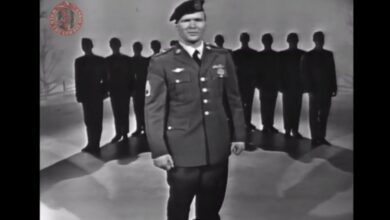At 67, Jeannie C. Riley’s charm shines bright with “Harper Valley PTA,” unchanged over time.
Jeannie C. Riley’s influence on the country music scene is both significant and multifaceted. Hailing from humble beginnings in Stamford, Texas, she forged a path for women in a genre predominantly influenced by male artists. With the release of “Harper Valley PTA” in 1968, she not only captivated listeners but also made notable strides in advancing female representation within the music industry. The song soared to the top of both the Billboard Hot Country Songs and Hot 100 charts, becoming a cultural landmark and an essential moment in the progression of country music and women’s roles in it.
Riley’s musical journey began in a family that cherished music, nurturing her love for singing and songwriting from a young age. This supportive environment helped her navigate the challenges of her early career. The 1960s, characterized by societal transformations and a reevaluation of traditional roles, provided the perfect backdrop for her emergence. As she arrived in Nashville, she immersed herself in a vibrant music community filled with aspiring artists. Despite various hurdles, her determination to succeed never wavered.
The story within “Harper Valley PTA” serves as a pointed critique of societal conventions. Written by the talented Tom T. Hall, the song narrates the experiences of Mrs. Johnson, a mother who challenges the moralistic standards imposed by her local PTA. This narrative resonates with universal themes of defiance and empowerment, mirroring the challenges faced by many women under social expectations. Jeannie C. Riley’s compelling rendition transformed the song into a powerful anthem for those advocating for equality and recognition.
Riley’s talent extended beyond her song choices; it encompassed the dynamic energy she brought to her performances. Her authentic voice and emotional resonance captured the attention of audiences, solidifying her reputation as a captivating performer. “Harper Valley PTA” transcended being merely a chart-topping hit; it emerged as a rallying cry for women to stand up for their beliefs and question conventional norms. This achievement thrust Riley into the limelight, establishing her as a significant figure in American music.
As her career unfolded, Riley exhibited remarkable versatility by embracing various musical styles. She ventured into genres like gospel and pop, showcasing her willingness to experiment beyond traditional country confines. This adaptability was crucial as the industry evolved, enabling her to remain relevant while staying true to her artistic identity. Her ability to navigate change without compromising herself exemplifies her resilience and dedication.
Nonetheless, the pressures of fame brought their share of challenges. Amidst the allure of stardom, Riley faced personal struggles, grappling with the complexities of life in the public eye. Striking a balance between her professional persona and personal identity required immense strength and self-awareness. Her journey sheds light on the hurdles many female artists encounter, highlighting a narrative of perseverance in the face of adversity. Despite these challenges, Riley’s steadfast commitment to her craft allowed her to thrive in an ever-evolving musical landscape.
Years later, during her New Year’s Eve performance in 2012, Riley showcased that her artistry remained lively and captivating. The audience applauded not only for nostalgia but also for the joy she exuded on stage. Fans, both long-time and new, cherished her ability to connect with listeners across generations, reinforcing her status as a timeless performer. Viewers shared a deep admiration for her enduring talent, showing that her music continues to resonate well beyond its original release.
Looking back on her legacy, Riley recognizes the profound impact she has had on future generations of women in music. Her journey has motivated countless female artists to pursue their dreams, empowering them to express their stories and experiences through song. Today’s country music landscape is enriched by the contributions of women, many of whom stand on the shoulders of trailblazers like Riley, who bravely challenged conventions and defied societal norms.
Beyond her chart-topping successes, Riley’s music addresses a wide array of themes and narratives that resonate across various cultural contexts. Her lyrics often capture the everyday struggles and victories of life, grounding her artistry in authenticity. This relatability ensures her work remains relevant, appealing to a diverse audience eager to engage with the narratives woven into her songs.
Ultimately, Jeannie C. Riley’s career illustrates the transformative power of music. Her journey from a small-town girl to a celebrated artist serves as a source of inspiration, demonstrating the potential for personal and cultural change through creativity. As she continues to perform and connect with her audience, Riley’s significant influence on country music and its ongoing evolution remains intricately woven into the tapestry of American musical history. Through her resilience and artistry, she has become not simply a musician but a cultural icon whose legacy will likely inspire and motivate generations to come.





